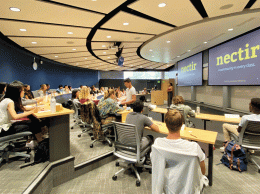By Scott Harris on April 5, 2013
In 27 years of owning a marketing and advertising agency, I have had the opportunity to work with hundreds of different clients and more than 100 employees.
Some of those relationships have been great from the start, some rough from the beginning, some have improved and some fell apart.
That is, of course, the nature of both business and personal relationships.
Over the course of this journey, I have, inevitably, learned a few lessons. While these are usually lessons I discuss in detail with my staff and encourage — even insist — they learn from and follow, they work equally well in client/vendor relationships. Either way, if followed, they reduce mistakes and stress, lead to stronger relationships and increased efficiency.
One: Never guess. It seems obvious, but it continues to surprise me how often people guess at things they should know, but are afraid or embarrassed to ask.
The risk of guessing is almost never worth the cost if you guess wrong. If it’s something you should have known, or did know and forgot, apologize — but ask. If you have to ask on a regular basis, do a little soul-searching and see if your notetaking and listening skills are where they should be.
If you’re the one being asked on a regular basis, take a look and see if it’s possible you’re not being as clear as you should.
And last, if you’re in charge of an environment where people are afraid of asking, strongly consider changing your management style; and if you’re working for someone where you’d rather not ask, consider changing your place of employment.
Two: Please don’t ever say, “Sorry, but I did my best.”
One of my favorite quotes is: “Children should be judged by their efforts, adults, by their results.”
The workplace is too competitive and the business climate is still too challenging to expect your boss or your client to accept that it’s okay if you failed, as long as you tried. If the best you can do is not good enough, or not better than the next person in line, you should anticipate that a change will be made soon.
Far too many of us have gotten used to accepting failure. Work harder, think more, ask questions—but get the job done. You’ll be rewarded in many ways for many years if your co-workers, bosses and clients view you as a problem solver, not a problem.
Three: Be careful — and make sure you fully understand what it means — before you utter the phrase, “I take full responsibility.” Somehow, this generation seems to mistake that statement for what they really mean, which is, “I blew it,” or, “It’s my fault.”
Acknowledging that you made a mistake is nowhere close to taking full responsibility. In my business, if we make a mistake in proofing and a typo shows up, we are responsible for reprinting the job.
It doesn’t happen often, but we’re not perfect and when it does happen, it is expensive.
More than once the person who has made the mistake will say, “I take full responsibility.” I thank them and tell them how much the reprints going to cost and that it will come out of their next check. There is always a look of surprise. I never do take the costs out of the checks, but use that opportunity to explain the difference between acknowledging an error and “taking full responsibility.” It usually only has to happen once for the lesson to be learned.
While I believe these lessons are universal and in many ways common sense, it never hurts to have an occasional reminder; and if it turns out that one or two of the ideas are new to you, so much the better.
• Scott Harris is the owner of Mustang Marketing, a marketing agency serving Ventura County and the San Fernando Valley. Contact him at scott@mustangmktg.com.






 Print
Print Email
Email

















